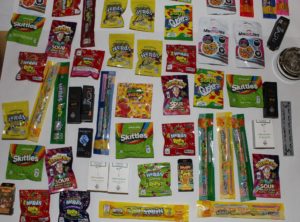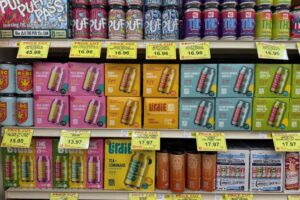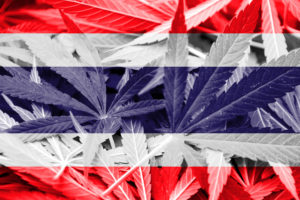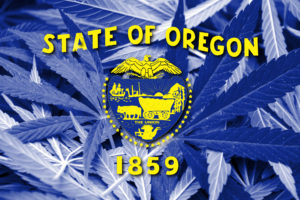The U.S. Patent and Trademark Office’s policy of rejecting applications to register trademarks that identify nonhemp cannabis products, as well as certain hemp CBD products, reflects an unduly doctrinaire approach that ultimately makes Americans less safe. As the cannabis industry continues to enter the business mainstream, the extension of trademark rights to cannabis companies’ products would provide them with additional incentives to develop reputations for quality and safety, setting them apart from actors on the margins of legal markets at the state level. In addition, it would empower cannabis companies to, in concert with law enforcement, pursue counterfeiters peddling unregulated products.
In March, it was reported that Florida law enforcement agencies were expressing concern about “THC-laced candy and snacks … making their way into the hands of children and teens.” THC refers to tetrahydrocannabinol, “the substance … primarily responsible for the effect of marijuana on a person’s mental state.” The level of THC in a cannabis plant determines if that particular plant is legally considered marijuana or hemp. Cannabis with a THC concentration of more than 0.3% on a dry-weight basis is considered marijuana, which is a scheduled drug according to the Controlled Substances Act. By contrast, following the enactment of the Agriculture Improvement Act of 2018, commonly known as the 2018 Farm Bill, cannabis with 0.3% THC or less is considered hemp, which is not a controlled substance per the CSA.
But while hemp and hemp products with 0.3% THC or less are no longer treated as controlled substances, certain hemp products containing cannabidiol are still unlawful under federal law. To be clear, CBD itself is not illegal. However, it is the view of the U.S. Food and Drug Administration that foods, dietary supplements and drugs containing CBD cannot be sold legally, in accordance with the Federal Food, Drug and Cosmetic Act.
The THC candies found in Florida were of particular concern to officials because “some of the marijuana edibles are hard to spot at first glance.” In a Facebook post, the Charlotte County Sheriff’s Office, or CCSO, warned that, “without looking closely, you would never know that these candies, that bear a striking resemblance to ordinary candy, [are] actually THC infused edibles.”
The following photograph, courtesy of the CCSO, clearly depicts packages that prominently display the trademarks of famous candy brands, such as Skittles and Nerds. As the CCSO notes, it is only upon close inspection that the true nature of the candies becomes evident. For example, a Cheetos bag shown in an image supplied by the Sarasota County School District is imprinted on the bottom left with a small square containing the letters “THC” and a content in milligrams that is illegible on the image provided. On the bottom right corner, there is a triangle framing a cannabis leaf and an exclamation point, with the letters “CA” below it.
Those familiar with cannabis terminology and imagery will be immediately alerted to the presence of the term THC and the familiar shape of the cannabis leaf. However, it is reasonable to assume that there are many people who are not be able to make the connection between these symbols and marijuana. As a result, there is a real risk that the edibles will in some cases be consumed by people who do not wish to ingest THC, or any cannabis at all.
Trademark Rights
It is precisely because of the risks presented by counterfeits such as the candies found in Florida that the laws of the U.S. — and those of virtually every country in the world — protect trademarks rights. Lawmakers want the public to have the assurance that the Skittles bag it purchases in a store in Sarasota or Bradenton, Florida, is made by or under the authority of the Wrigley Co. In order to offer that assurance, the law grants to brand owners such as Wrigley the exclusive right to use trademarks such as SKITTLES and prohibits unauthorized use of those trademarks.
The fact that the fake candies found in Florida contain a controlled substance is certainly newsworthy, but largely irrelevant in the context of trademark rights. Needless to say, a candymaker like Wrigley does not want a product containing THC inside a bag bearing its trademarks. At the same time, it does not want real candy of unknown provenance inside such a bag either. This is true for a number of reasons, not least the potential for lost profits. In addition, companies like Wrigley do not want the good reputations they have built over decades tarnished because of some criminal’s unsanitary or foul-tasting fakes.
For their part, government authorities worry about the risks to consumers presented by fake products. By definition, counterfeiters operate on the margins of the law; their business model is predicated upon anonymity and the accompanying lack of accountability. If a candymaker is willing to infringe a trademark in pursuit of profit, there is a good chance it is also willing to ignore food safety laws, just as we should not expect the makers of counterfeit toys to heed child safety rules.
Trademark rights play a key role in the efficient operation of consumer markets, incentivizing companies to innovate, by protecting their exclusive right to monetize their brands. These rights also provide additional rewards for maintaining high quality and safety standards.
The case of the Florida THC candies, however, serves as a reminder of the fact that many cannabis companies operating legally in an increasing number of states are being denied trademark protection, to the detriment of the public. The USPTO refuses to register trademarks for products considered marijuana — that is, cannabis over the 0.3% THC limit — as well as certain CBD products such as edibles, whose sale the FDA considers unlawful.
Challenges for Cannabis Companies
Like companies in other sectors of the economy, cannabis companies face the risk of having their products counterfeited. As with other instances of counterfeiting, this presents risks not just to cannabis companies themselves, but also to consumers.
Consider for example a company that manufactures CBD edibles legally under the laws of Washington state. This company is subject to stringent regulatory oversight in its home state, yet it is not entitled to federal trademark protection against an anonymous infringer selling edibles made in completely unregulated fashion.
Another risk involves the misidentification of products. For example, a counterfeiter might introduce into the market products that contain THC with fake labeling indicating that they are just hemp products. It might also misstate THC or CBD amounts.
The THC edibles found in Florida presented serious risks to potential consumers. Fortunately, the fact that the fakes infringed on the trademarks of household names such as Cheetos and Skittles probably helped trigger alarms. Perhaps a teacher who eats genuine Cheetos noticed something askew with the packaging on a student’s Cheetos bag. A parent may have been surprised by the soft consistency of the edibles, at odds with how actual Skittles should feel.
However, for the time being at least, few if any cannabis companies enjoy such powerful brand recognition, meaning that few people will be able to notice irregularities in packaging or product characteristics.
In addition, companies such as Wrigley, Ferrara Candy Co. and Frito-Lay Inc., owners of the “Skittles,” “Nerds” and “Cheetos” trademarks, respectively, usually run brand protection programs. As part of these programs, they conduct market monitoring to help detect traffic in their fakes and incorporate anti-counterfeiting technology in their genuine products.
They also cooperate with law enforcement, for example recording their intellectual property with customs agencies such as U.S. Customs and Border Protection to facilitate efforts to prevent the trade in counterfeit goods.
A Way Out?
Cannabis companies are largely deprived of tools to combat piracy. A company may discover counterfeiting activity, but it may not be of much use if there is no enforceable trademark. The logical solution to remedy this issue is to allow cannabis companies duly registered with state authorities to register their trademarks at the federal level for all their products, including those considered marijuana, as well as the CBD products not approved by the FDA.
The USPTO’s examination guide notes that “Use of a mark in commerce must be lawful under federal law to be the basis for federal registration” and points to the authority of Section 907 of the Trademark Manual of Examining Procedure. In turn, the manual points to various authorities, including sections 1 and 45 of the Trademark Act.
It is worth noting that the word “lawful” does not appear at all on Section 1, while Section 45 simply defines “commerce” as “all commerce which may lawfully be regulated by Congress.”
However, lawful use has become a requirement in practice, upheld by several Trademark Trial and Appeal Board rulings on the subject. According to the TTAB:
to hold otherwise would be to place the [USPTO] in the anomalous position of accepting as a basis for registration a shipment in commerce which is unlawful under a statute specifically controlling the flow of such goods in commerce.
Given USPTO and TTAB practice, the only realistic path extending trademark protection to cannabis companies may be through an amendment the Trademark Act or new federal legislation. Such an initiative would represent a step toward harmonizing federal law with the nation’s changing cannabis landscape, without requiring lawmakers to consider a change to the legal status of marijuana and CBD themselves.
Considering how extending full trademark protection to cannabis companies would be in the public interest, by keeping unregulated products out of consumers’ hands, it should not be a controversial move.
Editor’s Note: A version of this article first ran on Law360 on May 3, 2021.

























